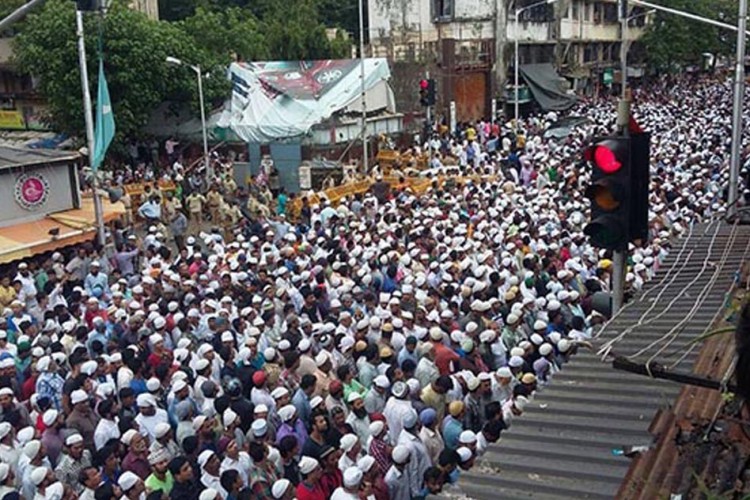A LAMENT ON DEATH OF A HERO
YAKUB MEMON SHAHEED
A Reader’s Comment
RULA RULA DIYA YAAR………ALLAH PAAK INKO JANNAT-UL-FIRDOUS MAIN JAGHA ATTA FARMAY……..AAMEEN…..YAA RABBAL-AALAMEEN
HE WAS OUR BROTHER……A CHARTERED ACCOUNTANT BY EDUCATION & PROFESSION AND WAS DEALT LIKE THIS……ALLAH PAAK UNKEE SHAHADAT KO QABOOL FARMAY……. AAMEEN…..YAA RABBAL-AALAMEEN…….& INNA-LILLAH-HAY WA-INNA ALAIHAY RAJIOUN…..MORE THAN 3 HUNDRED THOUSAND PRAYED HIS NAMAZ-E-JINAZA……SUBHAN-ALLAH…!
===================
Hanging Yakub Memon Makes Us Murderers Too
The news of the hanging of Yakub Memon has been greeted across the country with reactions ranging from dismay to scarcely-concealed bloodlust. I joined the public debate by expressing my sadness that our government has hanged a human being, whatever his crimes may have been. State-sponsored killing diminishes us all, I added, by reducing us to murderers too. I stressed that I was not commenting on the merits of this or any specific case: that’s for the Supreme Court to decide. My problem is with the principle and practice of the death penalty in our country.
The overwhelming evidence suggests that the death penalty cannot be justified as an effective instrument of the state. Look at the numbers: there’s no statistical correlation between applying the death penalty and preventing murder. About 10 people were executed from 1980 to 1990 for the offence of murder under section 302 of the India Penal Code, but the incidence of murder increased from 22,149 to 35,045 during the same period. Similarly, during 1990-2000, even though about 8 people were executed, the incidence of murder increased from 35,045 to 37,399. However, during 2000-2010, only one person was executed and the incidence of murder decreased from 37,399 in 2000 to 33,335 in 2010. No correlation: QED.
The death penalty does not actually deter an individual from committing an offence. In fact, studies show that an individual is rarely aware of the legal implications of his acts – in other words no criminal decides not to commit a crime because he is aware that a death sentence might follow. Additionally, the ambiguous application of the “rarest of the rare” principle enunciated by the Supreme Court further disables an individual from determining what offence would actually lead to a sentence of death penalty, and what would instead lead to life imprisonment. For any punishment to be an effective deterrence, it is important for ordinary people, especially potential criminals, to understand a clear relation between an offence and its punishment; but the odds of being hanged even for murder are very unpredictable indeed.
Studies have also proved that the application of the death penalty in India depends on various variables such as the biases of the judiciary, the arbitrariness of the Executive, social and communal biases, public outrage (especially against those complicit in terrorism or crimes against women involving rape and murder), the economic status of the accused (many more poor criminals are executed than well-off ones), and the quality of legal representation. The judicial use of expressions like “the collective conscience of the community has been shocked” to justify the death penalty testifies to the room for subjectivity and the grave risk that ill-informed media rhetoric can affect a decision.
Our existing criminal justice system leaves much room for errors and biases, especially because the system is created and implemented by humans. There is a possibility that the investigating agency is not able to collect sufficient and relevant evidence, the legal counsel is not competent enough to assess and defend his case, the judge is influenced by personal biases and media reports, and a lengthy criminal trial destroys the evidence. All such factors can never lead to an error-free assessment; it’s a worrying basis to take a human life.
These factors leave much room for the arbitrary and disproportionate application of capital punishment. While 436 death sentences were imposed by the lower courts in the four years from 2010-13, 280 were commuted to life imprisonment and only two people were actually executed. However, all death sentences have not been commuted: many stay in an appalling limbo for decades. There are no comprehensive parameters to ascertain whether a person has been rightfully executed. It is morally difficult to justify taking such an extreme step when there is so much ambiguity about both the fairness of the death penalty and its efficacy.
The Law Commission had organized consultations just a couple of weeks ago to assess the effectiveness of the provisions governing the death penalty in India and the purpose of the penalty itself. This had been prompted by the Supreme Court taking note of the errors, the arbitrariness, and the judicial bias affecting the award of a death sentence. Unsurprisingly, based on the evidence and the opinions presented at the Law Commission’s hearings, there was a general consensus on the inability of the courts to adopt a fair and non-discriminatory approach to the death penalty, and overwhelming opinion in favour of its abolition.
I am told my comments on social media this morning were met by a response from the government that I should not be politicizing the issue. I don’t see anything political in my statement of principle. But since politics has been mentioned, let me respond that it would be disingenuous to suggest that the imposition of the death penalty is free from any political motivations. After all, the final decision on mercy petitions or to commute a death sentence is taken by the political executive, which advises the President, who has the final say in deciding the execution of a death sentence but, is expected to act in accordance with the guidance of the Council of Ministers. The decision is therefore bound to be influenced by popular public opinion and political calculation.
The fundamental issue remains that innumerable studies and statistics support the view that there is no direct correlation between death penalty and deterrence. So why have it? The answer is simple: revenge and retribution. He killed (or participated in killing), therefore he should be killed. Is that a worthy act for a State? Should our society be practising the philosophy of ‘an eye for an eye’? Revenge is not an acceptable justification for any governmental punishment. And the inept criminal justice system and the existing judicial and economic biases, which are further aggravated by inflamed public opinion, can hardly ensure the fair use of the death penalty, so we may in some cases be exacting revenge on the wrong people. Innocent, reformed and reformable people have been given the death penalty even though they no longer pose any serious danger to society.
There’s only one possible conclusion as far as I’m concerned. The provisions governing capital punishment cannot be reformed. Therefore the death penalty should be abolished.
(Dr Shashi Tharoor is a two-time MP from Thiruvananthapuram, the Chairman of the Parliamentary Standing Committee on External Affairs, the former Union Minister of State for External Affairs and Human Resource Development and the former UN Under-Secretary-General. He has written 15 books, including, most recently, India Shastra: Reflections On the Nation in Our Time.)
Disclaimer: The opinions expressed within this article are the personal opinions of the author. The facts and opinions appearing in the article do not reflect the views of NDTV and NDTV does not assume any responsibility or liability for the same.





